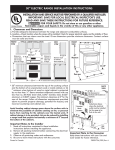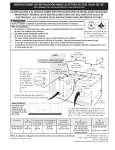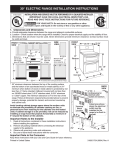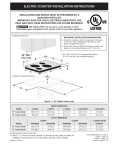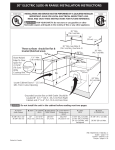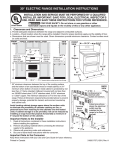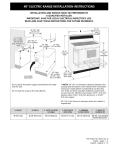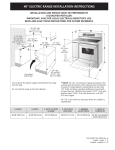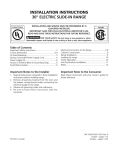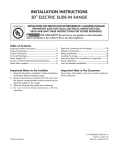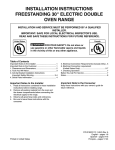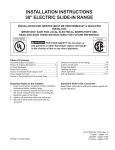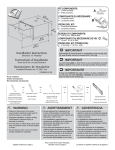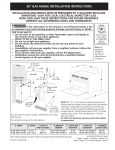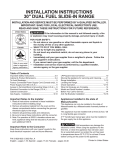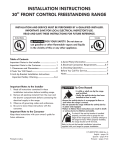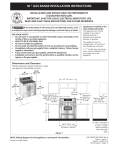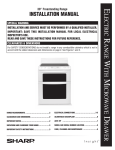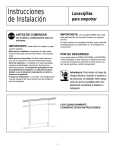Download 40" electric range installation instructions
Transcript
40" ELECTRIC RANGE INSTALLATION INSTRUCTIONS United States INSTALLATION AND SERVICE MUST BE PERFORMED BY A QUALIFIED INSTALLER. IMPORTANT: SAVE FOR LOCAL ELECTRICAL INSPECTOR'S USE. READ AND SAVE THESE INSTRUCTIONS FOR FUTURE REFERENCE. FOR YOUR SAFETY: Do not store or use gasoline or other flammable vapors and liquids in the vicinity of this or any other appliance. 40 1/8" Min. (101.9cm) 2¾" Min. (7cm Min.) for open door. On left side only, if there is a wall 36 3/8" (92.4cm) C 30" Min.** (76.2cm Min.) B 13" Max. 18" Min. (45.7cm Min.) (33cm Max.) 36" (91.4cm) feet extended 24" Min. (61cm Min.) 24½" max. (62.2cm Max.) Grounded Wall Outlet A D **NOTE: 24" (61 cm) minimum clearance between the cooktop and the bottom of the cabinet when the bottom of wood or metal cabinet is protected by not less than 1/4" (0.64 cm) flame retardant millboard covered with not less than No. 28 MSG sheet metal, 0.015" (0.4 mm) stainless steel, 0.024" (0.6 mm) aluminum, or 0.020" (0.5 mm) copper. Do not pinch the power supply cord between the range and the wall. Do not seal the range to the side cabinets. 30" (76.2 cm) minimum clearance when the cabinet is unprotected. A. HEIGHT B. WIDTH 48 1/8" (122.2cm) 40 1/8" (101.9cm) C. DEPTH TO FRONT OF RANGE D. DEPTH WITH DOOR OPEN E. MINIMUM CUTOUT WIDTH 26 1/4" (66.7cm) 44 5/8 (113.3cm) 40 1/4" (102.2cm) with Handle 28 1/2" (72.4cm) 1 F. HEIGHT OF COUNTERTOP 36" (91.4cm) standard 35 7/8" (91.1cm) min. P/N 318201704 (0907) Rev. B English - pages 1 - 8 Español - páginas 9 - 16 40" ELECTRIC RANGE INSTALLATION INSTRUCTIONS Important Notes to the Installer • Before installing the range in an area covered with linoleum or any other synthetic floor covering, make sure the floor covering can withstand heat at least 90°F/32°C above room temperature without shrinking, warping or discoloring. Do not install the range over carpeting unless you place an insulating pad or sheet of ¼" (6.4 mm) thick plywood between the range and carpeting. • Do not obstruct the flow of air at the oven vent nor around the base or beneath the lower front panel of the range. Avoid touching the vent openings or nearby surfaces as they may become hot while the oven is in operation. This range requires fresh air for proper operation. 1. Read all instructions contained in these installation instructions before installing range. 2. Remove all packing material from the oven compartments before connecting the electrical supply to the range (see "Preparation", page 6). 3. Two anti-tip brackets, located inside the oven cavity MUST be installed (see "Anti-Tip Bracket Installation", page 8). 4. Observe all governing codes and ordinances. 5. Be sure to leave these instructions with the consumer. Important Note to the Consumer Keep these instructions with your owner's guide for future reference. Never leave children alone or unattended in the area where an appliance is in use. As children grow, teach them the proper, safe use of all appliances. Never leave the oven door open when the range is unattended. IMPORTANT SAFETY INSTRUCTIONS • Be sure your range is installed and grounded Stepping, leaning or sitting on the door(s) or drawer of this range can result in serious injuries and can also cause damage to the range. properly by a qualified installer or service technician. • This range must be electrically grounded in accordance with local codes or, in their absence, with the National Electrical Code ANSI/NFPA No. 70—latest edition. • The installation of appliances designed for manufactured (mobile) home installation must conform with Manufactured Home Construction and Safety Standard, title 24CFR, part 3280 [Formerly the Federal Standard for Mobile Home Construction and Safety, title 24, HUD (part 280)] or when such standard is not applicable, the Standard for Manufactured Home Installation 1982 (Manufactured Home Sites, Communities and Setups), ANSI Z225.1/NFPA 501Alatest edition, or with local codes. • Make sure the wall coverings around the range can withstand the heat generated by the range. • All ranges can tip. • Injury to persons could result. • Install antitip device packed with range. • Do not store items of interest to children in the cabinets above the range. Children could be seriously burned climbing on the range to reach items. • To eliminate the need to reach over the surface units, cabinet storage space above the units should be avoided. • Do not use the oven as a storage space. This creates a potentially hazardous situation. • Never use your range for warming or heating the room. Prolonged use of the range without adequate ventilation can be dangerous. • Do not store or use gasoline or other flammable vapors and liquids near this or any other appliance. Explosions or fires could result. • Reset all controls to the "off" position after using a programmable timing operation. DURING SELF-CLEAN: • Remove broiler pan, food and other utensils before self-cleaning the oven. Wipe up excess spillage. Follow the pre-cleaning instructions in the Owner's Guide. To reduce the risk of tipping of the range, the range must be secured by properly installed antitip bracket (s) provided with the range. To check if the bracket (s) is installed properly, remove the lower panel or storage drawer and verify that the anti-tip bracket (s) is engaged. 2 40" ELECTRIC RANGE INSTALLATION INSTRUCTIONS 2. Access to Terminal Block & Model and Serial Number Location The serial plate is located on the oven front frame behind the large oven door. Grounding Strap When ordering parts for or making inquiries about your range, always be sure to include the model and serial numbers and a lot number or letter from the serial plate on your range (Figure 1). Serial Plate Location To gain access to lower terminal block bend lower back cover plate along row of holes shown here Figure 2 This appliance is manufactured with the frame grounded by connection of a grounding strap between the neutral power supply terminal and the frame. If used in USA, in a new branch circuit installation (1996 NEC), mobile home or recreational vehicle, where local code do not permit grounding through neutral (white) wire or in Canada; remove the grounding strap from the frame and cut the other end, near the neutral terminal. Connect the appliance in usual manner. Figure 1 1. Power Supply Cord Kit The user is responsible for connecting the power supply cord to the connection block located behind the back panel access cover. This appliance may be connected by means of permanent "hard wiring"; flexible armored or nonmetallic shielded copper cable (when local code allow it) or by means of a power supply cord kit. Electrical Shock Hazard Risk of fire or electrical shock exists if an incorrect size range cord kit is used, the Installation Instructions are not followed, or the strain relief bracket is discarded. • Electrical ground is required on this appliance. • Do not connect to the electrical supply until appliance is permanently grounded. • Disconnect power to the circuit breaker or fuse box before making the electrical connection. • This appliance must be connected to a grounded, metallic, permanent wiring system, or a grounding connector should be connected to the grounding terminal or wire lead on the appliance. Failure to do any of the above could result in a fire, personal injury or electrical shock. For mobile homes, new installations or recreational vehicles, use only a power supply kit designed for a range at 125V/250V 50A recommended (minimum 40A). Cord must have either 3 (when local code permits grounding through neutral) or 4 conductors. Terminal on end of wires must be either closed loop or open spade lug with upturned ends. Cord must have strain-relief clamp. Do not loosen the nuts which secure the factory-installed range wiring to terminal block while connecting range. Electrical failure or loss of electrical connection may occur. NOTE: Range is shipped from factory with 1 1/8" dia. hole as shown in figure 3. If a larger hole is required, punch out the knockout. 3 40" ELECTRIC RANGE INSTALLATION INSTRUCTIONS 3. Electrical Connection to the Range Four Conductor Wire Connection to Range Where local codes does NOT permit connection of the frame grounding conductor to the neutral wire of the copper power supply cord (see Figure 4): 1. Remove the 3 screws at the lower end of the rear wire cover, then raise the lower end of the rear wire cover (access cover) upward to expose range terminal connection block (see figure 2). 2. Remove the grounding strap from the terminal block and from the appliance frame. 3. Using the nuts supplied with the literature package, connect the ground wire (green) of the copper power supply cord to the frame of the appliance with the ground screw, using the hole in the frame where the ground strap was removed (see Figure 4). 4. Connect the neutral of the copper power supply cord to the center silver-colored terminal of the terminal block, and connect the other wires to the outer terminals. Match wires and terminals by color (red wires connected to the right terminal, black wires connected to the left terminal). 5. Lower the terminal cover and replace the 3 screws. Three Conductor Wire Connection to Range If local codes permit connection of the frame grounding conductor to the neutral wire of the copper power supply cord (see Figure 3): 1. Remove the 3 screws at the lower end of the rear wire cover, then bend the lower end of the rear wire cover (access cover) upward to expose range terminal connection block (see Figure 2). 2. Using the nuts supplied in the literature package, connect the neutral of the copper power supply cord to the center silver-colored terminal of the terminal block, and connect the other wires to the outer terminals. Match wires and terminals by color (red wires connected to the right terminal, black wires connected to the left terminal) (see figure 3). 3. Lower the terminal cover and replace the 3 screws. Silver Colored Terminal Red Wire Terminal Block Cord Mounting Plate Terminal Block Red Wire Neutral (White Wire) Black Wire Black Wire Grounding Strap A User Supplied Strain-relief Must Be Installed at This Location. Silver Colored Terminal To 240 V Receptacle Figure 3 1 1/8" (2.9cm) Dia. Direct Connection Hole. Punch Out Knockout for 1 3/8" (3.5cm) Dia. Cord Kit Hole. 1 1/8" (2.9 cm) Dia. Direct Connection Hole. Punch Out Knockout for 1 3/8" (3.5 cm) Dia. Cord Kit Hole. A User Supplied Strain-relief Must Be Installed at This Location Neutral (White Wire) Ground (Bare Copper Wire) To 240 V Receptacle NOTE: Be sure to remove the supplied grounding strap. Figure 4 4 40" ELECTRIC RANGE INSTALLATION INSTRUCTIONS Direct Electrical Connection to the Circuit Breaker, Fuse Box or Junction Box Where local codes DO NOT permit connecting the appliance-grounding conductor to the neutral (white) wire, or if connecting to 4-wire electrical system (see Figure 6): 1. Be sure that no power is supplied on the cable from residence. 2. Remove the grounding strap from the terminal block and from the appliance frame. 3. In the circuit breaker, fuse box or junction box: a)Connect the white appliance cable wire to the neutral (white) wire. b)Connect the 2 black wires together. c)Connect the 2 red wires together. d)Connect the green (or bare copper) grounding wire to the grounding wire of the circuit breaker, fuse box or junction box. If the appliance is connected directly to the circuit breaker, fuse box or junction box, use flexible, armored or nonmetallic sheathed copper cable (with grounding wire). Supply a U.L. listed strain-relief at each end of the cable. At the appliance end, the cable goes through the Direct Connection Hole (see Figure 5) on the Cord Mounting Plate. Wire sizes (copper wire only) and connections must conform to the rating of the appliance. Where local codes permit connecting the appliancegrounding conductor to the neutral (white) wire (see Figure 5): 1. Be sure that no power is supplied on the cable from residence. 2. Remove the grounding strap from the terminal block and from the appliance frame. 3. In the circuit breaker, fuse box or junction box: a) Connect the green (or bare copper) wire, the white appliance cable wire, and the neutral (white) wire together. b) Connect the 2 black wires together. c) Connect the 2 red wires together. Cable from Residence Green (or Bare Copper) Wire White Wire Red Wires Black Wires Cable from Residence Neutral (white) Wire Green (or Bare Copper) Wire Black Wires White Wire Junction Box Red Wires Cable from Appliance Junction Box NOTE: Be sure to remove the supplied grounding strap. White Wire Green (or Bare Copper) Wire Cable from Appliance U.L.-listed Conduit Connector (or CSA listed) Figure 6 – 4-Wire Electrical System (Example: Junction Box) U.L.-listed Conduit Connector (or CSA listed) NOTE: Be sure to remove the supplied grounding strap. Figure 5 3-Wire (Grounded Neutral) Electrical System (Example: Junction Box) 5 40" ELECTRIC RANGE INSTALLATION INSTRUCTIONS Junction Box Location on the floor where the back edge of the range will be. Now install anti-tip brackets (see "Anti-Tip Brackets Installation", page 8). Locate junction box as shown in Figure 7. If a service cord is used, the wall receptacle should be located in accordance with the dimensions below. If range will not be installed against a cabinet, move range into final position. Mark on the floor along both sides of the range. If back of range will not be flush with the wall (the location of the outlet may not allow the range to be positioned against the wall), draw a line on the floor where the back edge of the range will be. Now install anti-tip brackets (see "Anti-Tip Brackets Installation", page 8). Center Line of Range 10" (25.4 cm) WALL 20" (50.8 cm) 10" (25.4 cm) R FLOO 7" Max. (17.8 cm Max.) Locate Electrical Hook-up Inside Shaded Area Range Installation NOTE: 1. The back of the range may be installed directly against the rear wall of the structure. 2. These ranges conform to U.L. requirements for "0" spacing from the range to adjacent vertical walls above the countertop level. However, to reduce possible scorching of vertical walls and to minimize potential fire hazards under abnormal surface unit use conditions such as high heat or no pans, a minimum of 2" (5.1 cm) spacing should be provided on both sides of the cooktop. 3. If a wall is present on the left side of range, allow a minimum of 2 3/4" (7 cm) to open the auxiliary door. Center Line of Range Figure 7 Range Placement To eliminate the risk of burns or fire by reaching over heated surface units, cabinet storage space located above the range should be avoided. If cabinet storage space is to be provided, the risk can be reduced by installing a range hood that projects horizontally a minimum of 5" (12.7 cm) beyond the bottom of the cabinet. Excessive Weight Hazard • Use 2 or more people to move and install range. • Failure to follow this instruction can result in back or other injury. Center Line of Range Preparation 1. Put on safety glasses and gloves. Remove oven racks and parts package from inside the oven. Remove shipping materials, tape and protective film from the range. 2. Take 4 cardboard corners from the carton. Stack one on top of another. Repeat with other 2 corners. Place corners lengthwise on the floor in back of the range to support range. 3. Firmly grasp the range and gently lay it on its back on the cardboard corners. 4. Remove the 4 shipping bolts from the skid. Discard skid. 5. Lay a large piece of cardboard in front of the range. Carefully stand the range upright on cardboard. 6. Adjust the leveling legs to a point where the range base does not touch the floor. Follow instructions for the type of installation you have Figure 8 If range will be installed with a cabinet on both sides, draw a center line on the floor between the cabinets (see figure 8). If back of range will not be flush with the wall (the location of the outlet may not allow the range to be positioned against the wall), draw a line on the floor where the back edge of the range will be. Now install anti-tip brackets (see "Anti-Tip Bracket Installation, page 8). If range will be installed with a cabinet on one side only, move the range into final position. Draw a line on the floor along the side of the range that is not against the cabinet. If back of range will not be flush with the wall (the location of the outlet may not allow the range to be positioned against the wall), draw a line 6 40" ELECTRIC RANGE INSTALLATION INSTRUCTIONS Leveling the Range Bake–After setting the oven to 350°F (177°C) for baking, the lower element in the oven should become red. Level the range and set cooktop height before installation in the cut-out opening (if applicable). 1. Install an oven rack in the center of the oven. 2. Place a level on the rack (see figure 9). Take 2 readings with the level placed diagonally in one direction and then the other. Level the range, if necessary, by adjusting the 4 leg levelers with a wrench (see Figure 11). 3. Slide range into cut-out opening and double check for levelness. If the range is not level, pull unit out and readjust leveling legs, or make sure floor is level. Broil–When the oven is set to BROIL, the upper element in the oven should become red. Clean–When the oven is set for a self-cleaning cycle, the upper element should become red during the preheat portion of the cycle. After reaching the self-cleaning temperature, the lower element will become red. Refer to the Owner's Guide packaged with the range for operating instructions and for care and cleaning of your range. Convection–When the oven is set to CONV. BAKE/ ROAST at 350°F (177°C), both elements cycle on and off alternately and the convection fan will turn. The convection fan will stop turning when the oven door is opened during convection baking or roasting. Do not touch the elements. They may be hot enough to cause burns. When All Hookups are Complete Check Operation Make sure all controls are left in the OFF position. Before You Call for Service Read the Avoid Service Checklist and operating instructions in your Owner's Guide. It may save you time and expense. The list includes common occurrences that are not the result of defective workmanship or materials in this appliance. Refer to the warranty and service information in your Owner's Guide for our phone number and address. Please call or write if you have inquiries about your range product and/or need to order parts. Figure 9 Remove all packaging from the oven before testing. 1. Operation of Surface Elements Turn on each of the four surface elements and check to see that they heat. Check the surface element indicator light(s), if equipped. 2. Operation of Oven Elements The oven is equipped with an electronic oven control. Each of the functions has been factory checked before shipping. However, it is suggested that you verify the operation of the electronic oven controls once more. Refer to the Owner's Guide for operation. Follow the instructions for the Clock, Timer, Bake, Broil, Convection (some models) and Clean (some models) functions. 7 40" ELECTRIC RANGE INSTALLATION INSTRUCTIONS Important Safety Warning 1. Unfold paper template and place it flat on the floor with the back and side edges positioned exactly where the back and sides of range will be located when installed. (Use the diagram in figure 10 to locate brackets if template is not available.) 2. Mark on the floor the location of the 4 mounting holes (2 holes per bracket) shown on the template. For easier installation, 3/16" (4.8 mm) diameter pilot holes ½" (1.3 cm) deep can be drilled into the floor. 3. Remove template and place brackets on floor with turned up flanges to the outside (see figure 10). Line up holes in brackets with marks on floor and attach with 4 screws provided (2 screws per bracket). Brackets must be secured to solid floor. If attaching to concrete floor, first drill 3/16" (4.8 mm) dia. pilot holes using a masonry drill bit. 4. Level range if necessary, by adjusting 4 leg levelers with wrench. (See Figure 11). A minimum clearance of 1/8" (3.2 mm) is required between the bottom of the range and the rear leg levelers to allow room for the anti-tip brackets. 5. Slide range into place making sure rear legs are trapped by ends of brackets. Range may need to be shifted slightly to one side as it is being pushed back to allow rear legs to align with brackets. 6. After installation, verify that the anti-tip bracket is engaged. Open and remove drawer and check to make sure the anti-tip bracket is engaged. To reduce the risk of tipping of the range, the range must be secured to the floor by properly installed anti-tip brackets and screws packed with the range. Those parts are located in a plastic bag in the oven. Failure to install the anti-tip brackets will allow the range to tip over if excessive weight is placed on an open door or if a child climbs upon it. Serious injury might result from spilled hot liquids or from the range itself. Follow the instructions below to install the anti-tip brackets. If range is ever moved to a different location, the antitip brackets must also be moved and installed with the range. To check for proper installation, see step 5. Tools Required: 5/16" (8 mm) Nutdriver Adjustable Wrench Electric Drill 3/16" (4.8 mm) Diameter Drill Bit 3/16" (4.8 mm) Diameter Masonry Drill Bit (if installing in concrete) Anti-Tip Brackets Installation Instructions Brackets attach to the floor at the back of the range to hold both rear leg levelers. When fastening to the floor, be sure that screws do not penetrate electrical wiring or plumbing. The screws provided will work in either wood or concrete. Slide Back Anti-Tip Bracket Leveling Leg ¾" (1.9 cm) Anti-Tip Bracket e 1/2" (1.3 cm) ¾" (1.9 cm) ng f Ra o e as B Sides of range Raise Lower Figure 10 Figure 11 8 INSTRUCCIONES DE INSTALACIÓN PARA LA ESTUFA ELÉCTRICA DE 40" LA INSTALACIÓN Y EL SERVICIO DEBEN SER EFECTUADOS POR UN INSTALADOR CALIFICADO. IMPORTANTE: GUARDE ESTAS INSTRUCCIONES PARA USO DEL INSPECTOR LOCAL DE ELECTRICIDAD. LEA Y GUARDE ESTAS INSTRUCCIONES PARA REFERENCIA FUTURA. Estados Unidos PARA SU SEGURIDAD: No almacene ni utilice gasolina u otros vapores y líquidos inflamables en la proximidad de este o de cualquier otro artefacto. 40 1/8" Mín. (101.9 cm) 2 3/4" Mín. (7 cm Mín.) para puerta abierta. Si hay uno pared, el lado izquierdo solamente 36 3/8" (92.4 cm) C 30" Mín.** (76.2 cm Mín.) B 13" Máx. 18" Mín. (45.7 cm Mín.) (33 cm Máx.) 36" (91.4 cm) A con las patas extendidas D 24" Mín. (61 cm Mín.) 24 1/2" Máx. (62.2 cm Máx.) Toma corriente de pared puesto a tierra **NOTA: Un espacio mínimo de 24" (61 cm) entre la superficie de la estufa y el fondo del armario cuando el fondo del armario de madera o metal está protegido por no menos de 1/4" (0.64 cm) de madera resistente al fuego cubierta por una lámina metálica de MSG, número 28, 0.015" (0.4 mm) de acero inoxidable, 0.024" (0.6 mm) de aluminio, ô 0.02" (0.5 mm) de cobre. No pellizque el cordón eléctrico entre la estufa y la pared. No selle la estufa a los armarios de lado. Un espacio mínimo de 30" (76.2 cm) cuando el armario no está protegido. A. ALTURA B. ANCHURA C. PROFUNDIDAD AL FRENTE DE LA ESTUFA D. PROFUNDIDAD CON PUERTA ABIERTA E. MÍNIMO DE ANCHO ESPACIO RECORTADO F. ALTURA DE MOSTRADOR 48 1/8" (122.2cm) 40 1/8" (101.9cm) 26 1/4" (66.7cm) con manija 28 1/2" (72.4cm) 44 5/8 (113.3cm) 40 1/4" (102.2cm) 36" (91.4cm) normal 35 7/8" (91.1cm) min. 9 P/N 318201704 (0907) Rev. B English - pages 1 - 8 Español - páginas 9 - 16 INSTRUCCIONES DE INSTALACIÓN PARA LA ESTUFA ELÉCTRICA DE 40" Notas importantes para el Instalador • Antes de instalar la estufa en un área cuyo piso este recubierto con linóleo u otro tipo de piso sintético, asegúrese de que éstos puedan resistir una temperatura de por lo menos 90°F sobre la temperatura ambiental sin provocar encogimiento, deformación o decoloración. No instale la estufa sobre una alfombra al menos que coloque una plancha de material aislante de por lo menos 1/4 pulgada, entre la estufa y la alfombra. • No obstruya el flujo del aire en la ventilación del horno ni tampoco alrededor de la base o debajo del panel inferior delantero de la estufa. Evite tocar las aberturas o áreas cercanas de la ventilación, ya que pueden estar muy calientes durante el funcionamiento del horno. La estufa requiere aire fresco para la operación. 1. Lea todas las instrucciones contenidas en este manual antes de instalar la estufa. 2. Saque todo el material usado en el embalaje del compartimiento del horno antes de conectar el suministro eléctrico a la estufa. 3. Dos soportes antivuelco DEBEN ser instalados. Para detalles, vea instrucciones en la páginas 16. 4. Observe todos los códigos y reglamentos pertinentes. 5. Deje estas instrucciones con el comprador. Nota Importante para el Consumidor Conserve estas instrucciones y el Manual del Usuario para referencia futura. IMPORTANTES INSTRUCCIONES DE SEGURIDAD Nunca deje niños solos o desatendidos en un área donde un artefacto está siendo usado. A medida que los niños crecen, enséñeles el uso apropiado y de seguridad para todos los artefactos. Nunca deje la puerta del horno abierta cuando la estufa está desatendida. • Asegúrese de que la estufa sea instalada y conectada a tierra en forma apropiada por un instalador calificado o por un técnico. • Esta estufa debe ser eléctricamente puesta a tierra de acuerdo con los códigos locales, o en su ausencia, con el Código Eléctrico Nacional ANSI/NFPA No. 70, última edición. • La instalación de aparatos diseñados para instalación en casas prefabricadas (móviles) debe conformar con el Manufactured Home Construction and Safety Standard, título 24CFR, parte 3280 [Anteriormente el Federal Standard for Mobil Home Construction and Safety, título 24, HUD (parte 280)] o cuando tal estandard no se aplica, el Standard for Manufactured Home Installation 1982 (Manufactured Home sites, Communities and Setups), ANSI Z225.1/NFPA 501A-edición más reciente, o con los códigos locales. • Asegúrese de que el material que recubre las paredes alrededor de la estufa, pueda resistir el calor generado por la estufa. •Todas las estufas pueden volcarse. •Esto podría resultar en lesiones personales. •Instale el dispositivo antivuelcos que se ha empacado junto con esta estufa. No se pare, apoye o siente en las puertas o cajones de esta estufa pues puede resultar en serias lesiones y puede también causar daño a la estufa. • No almacene artículos que puedan interesar a los niños en los gabinetes sobre la estufa. Los niños pueden quemarse seriamente tratando de trepar a la estufa para alcanzar estos artículos. • Los gabinetes de almacenamiento sobre la estufa deben ser evitados, para eliminar la necesidad de tener que pasar sobre los elementos superiores de la estufa para llegar a ellos. • No use el horno como espacio de almacenaje. Esto creará una situación potencialmente peligrosa. • Nunca use la estufa para calentar el cuarto. El uso prolongado de la estufa sin la adecuada ventilación puede resultar peligroso. • No almacene ni utilice gasolina u otros vapores y líquidos inflamables en la proximidad de éste o de cualquier otro artefacto eléctrico. Puede provocar incendio o explosión. • Ajuste todos los controles a la posición "OFF" (apagada) después de haber hecho una operación con tiempo programado. Para reducir el riesgo de que se vuelque la estufa, hay que asegurarla adecuadamente colocándole los soportes antivuelco que se proporcionan. Para comprobar si estos están instalados y apretados en su lugar como se debe, ase el borde trasero superior de la estufa y cuidadosamente inclínela hacia adelante para asegurar que la estufa se ancle. PARA AUTO-LIMPIEZA: • Saque la asadera, alimentos o cualquier otro utensilio antes de usar el ciclo de auto-limpieza del horno. Limpié todo exceso de derrame de alimentos. Siga las instrucciones de prelimpiado en el Manual del Usuario. 10 INSTRUCCIONES DE INSTALACIÓN PARA LA ESTUFA ELÉCTRICA DE 40" 2. Acceso a la terminal del bloque y Ubicación del Número de Modelo y de Serie La placa con el número de serie está ubicada en el marco delantero del horno detrás de la puerta del horno grande. la correa de tierra Cuando haga pedidos de repuestos o solicite información con respecto a su estufa, esté siempre seguro de incluir el número de modelo y de serie y el número o letra del lote de la placa de serie de su estufa (figura 1). La placa de serie está ubicada aquí. Figura 2 Para obtener acceso al tablero inferior de bornes, doble hacia atrás la placa de la cubierta trasera por la fila de agujeros que se ven aquí. Este electrodoméstico fue fabricado con el marco aterrizado a través de una correa de conexión entre el neutral de la fuente de alimentación y el marco. Si es utilizado en los E.E. U.U., con un circuito nuevo de instalación (1996 NEC), en casa sobre ruedas o vehículo recreativo, donde el código local no permite el atterizaje a través del cable neutro (blanco) o en Canadá; remueva la correa de aterrizaje del marco y corte el otro extremo, cerca de la terminal de neutral. Conecte el electrodoméstico de la forma usual. Figura 1 1. Estuche de cable del suministro eléctrico El utilizador es responsable de la conexión del cable del suministro eléctrico al bloque de conexión situado detrás del panel de acceso. El electrodoméstico se puede conectar a través de un cableado permanente “cableado duro”; cable de cobre blindado armado o cable no-metálico flexible (cuando el código local lo permite) o por medio de un kit de cable de alimentación. NOTA: La cocina corrediza eléctrica viene de fabrica con un agujero de diámetro 1 1/8" (2.9 cm) come se muestra en la figura 4. Si un agujero mas largo está necesario retire la arandela de la pre-cortada. Peligro de choque eléctrico El riesgo de fuego o de choque eléctrico puede aparecer si usa el tamaño de cable incorrecto, si las instrucciones de instalación no son seguidas o si retira la abrazadera de releva. • La conexión a tierra es requerida para este electrodoméstico. • No conecte al suministro eléctrico hasta que el electrodoméstico este conectado a tierra de manera permanente. • Desconecte el suministro eléctrico hacia la caja de empalmes antes de hacer la conexión eléctrica. • Este electrodoméstico debe ser conectado a un sistema de alambres permanentes, metálicos, conectados a tierra o una puesta a tierra debe ser conectada al terminal de tierra o un emplonbado al electrodoméstico. El no seguir ninguna de estas instrucciones podría causar fuego, heridas personales o choques eléctricos. Para casas sobre ruedas, nuevas instalaciones, en los vehículos de recreativos o en las lugares donde los códigos locales no permiten la conexión del conductor de tierra al neutro, un ensamble de suministro eléctrico de 4 conductores para estufas, calificado a 125/250 voltios mínimo, 40 Amperes mínimo, debe de ser utilizad. No desajuste las tuercas que aseguran la conexión de la cocina al bloque terminal cuando esté instalándola. El corte o la perdida de corriente eléctrica puede ocurrir. 11 INSTRUCCIONES DE INSTALACIÓN PARA LA ESTUFA ELÉCTRICA DE 40" 3. Conexión eléctrica a la cocina Conexión del cable de cuatro conductores a la cocina. Conexión del cable a tres alambres la cocina 1. Retire los 3 tornillos de la parte baja de la cubierta del cable trasero, luego levante la cubierta hacia arriba para tener acceso (cubierta de acceso) al bloque de conexión del borne terminal (vea figura 2). 2. Retire la correa de la base del bloque terminal y del armazón del electrodoméstico. Retenga el tornillo de la base. 3. Utilizar los tuercas suministraron en el paquete de la literatura para conectar el alambre de tierra (verde) del cable de bronce del suministro eléctrico al armazón del electrodoméstico con el tornillo de la base, usando el hoyo del armazón por donde retiró la correa de la base (vea figura 4). 4. Conecte el alambre neutral (blanco) del cable de cobre del suministro eléctrico al terminal plateado del centro del bloque terminal y, conecte los otros alambres a los terminales externos. 5. Baje la cubierta del terminal y vuelva al colocar los 3 tornillos. Si los códigos locales permiten la conexión del conductor a tierra del armazón al alambre neutral del cable de bronce del suministro eléctrico (vea figura 3). 1.Retire los 3 tornillos de la parte baja de la cubierta del cable trasero (cubierta de acceso), luego levante la cubierta hacia arriba para tener acceso al bloque de conexión del borne terminal (vea figura 2). 2. Utilizar los tuercas suministraron en el paquete de la literatura para conectar la parte neutral del cable de bronce de suministro eléctrico al terminal plateado que se encuentra al centro del bloque terminal y, conectar los otros alambres a los terminales externos. Aparee los alambres y los terminales según el color (alambres rojos conectados al terminal derecho, alambres negros conectados al terminal izquierdo) (vea figura 3). 3. Baje la cubierta del terminal y vuelva al colocar los 3 tornillos. Terminal plata Alambre rojo Bloque terminal Alambre Rojo Cordón de la placa de montaje Alambre Negro Neutro (Alambre Blanco) Banda de puesta a tierra Alambre Negro Una arazadera de releva provista debe de estar instalada a está ubicación. Terminal plata Bloque terminal 1 1/8" (2.9 cm) Dia. Agujero de la conexión directa. Retira la arandela precortada para 1 3/8" (3.5 cm) dia. agujero. 1 1/8" (2.9 cm) Agujero de la conexión directa. Retira la arandela preHacia el 240 V cortada para 1 3/8" (3.5 Receptáculo. cm) Dia. agujero. Neutro (Alambre Blanco) Puesta a tierra (cable de cobre) Una arazadera de releva provista debe de estar instalada a está Hacia el 240 V receptáculo ubicación. Figura 3 NOTA: Asegurese de quitar la banda de puesta a tierra provista. Figura 4 12 INSTRUCCIONES DE INSTALACIÓN PARA LA ESTUFA ELÉCTRICA DE 40" Conexión eléctrica directa al cortacircuito, a la caja de fusibles o la caja de empalmes Donde los códigos locales NO permitan conectar el conductor de puesta a tierra del electrodoméstico al neutral (blanco), o si está conectado con un sistema a 4 alambres (vea figura 6): 1. Desconecte el suministro eléctrico. 2. Separe el alambre verde (o cobre desnudo) y el alambre blanco del electrodoméstico. 3. En el cortacircuito, la caja de fusibles o la caja de empalmes: a. Conecte el alambre blanco del cable del electrodoméstico al alambre neutral (blanco). b. Conecte los 2 alambres negros juntos. c. Conecte los 2 alambres rojos juntos. d. Conecte el alambre verde (o de cobre desnudo) de la puesta a tierra del alambre al alambre de puesta a tierra del cortacircuito, de la caja de fusibles o de la caja de empalmes. Si el aparato está conectado directamente al cortacircuito, a la caja de fusibles o a la caja de empalmes, use un cable blindado flexible o no metálico recubierto de cobre (con alambre a tierra). Provee una abrazadera releva de anclaje homólogo UL a cada extremidad del cable. A la extremidad del electrodoméstico, el cable pase a través del agujero de la conexión directa (ver figura 5) en el cordón de la placa de montaje. El tamaño de los alambres (alambre de cobre solamente) y las conexiones deben estar conforme al régimen del electrodoméstico. Donde los códigos locales permitan conectar el conductor de puesta a tierra del electrodoméstico al neutral (blanco) (vea figura 5): 1. Desconecte el suministro eléctrico. 2. Quite la banda de puesta a tierra de la caja de empalmes y del marco de la estufa. 3. En el cortacircuito, la caja de fusibles o la caja de empalmes: a) Conecte el alambre verde (o cobre desnudo), el alambre blanco del cable del electrodoméstico y el alambre neutral (blanco) juntos. b) Conecte los dos alambres negros juntos. c) Conecte los dos alambres rojos juntos. Alambre desnudo o verde Alambres negros Alambre desnudo o verde Alambre blanco Alambres negros Caja de empalmes Alambres rojos Cable de la estufa NOTA: Asegúrese de quitar la banda de puesta a tierra provista. Caja de empalmes Cable de la estufa Conductor de unión listado-UL (o listado-CSA) Figura 6 Alambre blanco Alambre desnudos o verdes Alambre blanco Alambres rojos Cable de la fuente de alimentación Alambre neutro (blanco) Cable de la fuente de alimentación Sistema Eléctrico a 4 Alambres (Ejemplo: Caja de empalmes) Conductor de unión listado-UL (listado-CSA) NOTA: Asegúrese de quitar la banda de puesta a tierra provista. Figura 5 Sistema Eléctrico a 3 Alambres (Neutral puesta a tierra) (Ejemplo: Caja de empalmes) 13 INSTRUCCIONES DE INSTALACIÓN PARA LA ESTUFA ELÉCTRICA DE 40" Situación de caja de unión parte trasera de la estufa no estará a ras con la pared (la ubicación del tomacorriente puede que no permita que la estufa se pegue a ras con la pared), marque el piso donde el borde trasero de la estufa estará. Ponga el patrón en el piso y alinee el lado del patrón con la línea marcada en el piso. Alinee la parte trasera del patrón con la pared trasera o la línea marcada para la parte de atrás de la estufa. Localice la caja de empalmes como se ve en la Figura 7. Si se usa un cordón de servicio, el receptáculo de pared debe estar localizado según las medidas que se indican abajo. Construcción de los Armarios Center LineESTUFA of DE LA Range Si la estufa no será instalada junta contra un armario, mueva la estufa a su posición final. Marque el piso por los dos lados de la estufa. Si la parte trasera de la estufa no estará a ras con la pared (la ubicación del tomacorriente puede que no permita que la estufa se pegue a ras con la pared), marque en el piso donde el borde trasero de la estufa estará. Ponga el patrón en el piso y alinee los lados del patrón con las líneas marcadas en el piso. Alinee la parte trasera del patrón con la pared trasera o la línea marcada para la parte trasera de la estufa (vea instalación del Soportes Antivuelco página 8). 10" (25.4 cm) PARED WALL 20" (50.8 cm) 10" (25.4 cm) R LOO FPISO 7" Max. (17.8 cm Max.) UBIQUE LO ELÉCTRICO Locate Electrical Hook-up DENTRO DEL ÁREA Inside Shaded Area SOMBREADA Center Line of DE LA Range ESTUFA Instalación de la estufa NOTA: 1. La parte trasera de la estufa puede ser directamente instalada a ras con la pared trasera de la estructura. 2. Estas estufas se conforman a los requerimientos U.L. para espaciamiento “0” desde la estufa hasta las paredes verticales adyacentes arriba del nivel del tablero. No obstante, para reducir la posibilidad de quemar las paredes verticales y para disminuir el posible peligro de incendio bajo condiciones anormales de uso de la tapa con hornillas como alto calor o la ausencia de cazuelas, se debe dejar un espacio de un mínimo de 2" (5.1 cm) en ambos lados de la tapa. 3. Si una pared se encuentra en el lado izquierdo de la estufa, dejar 2 3/4" (7 cm) mín. par abrir la puerta auxiliar. Figura 7 Para eliminar el riesgo de quemaduras e incendios al tocar superficies sobrecalentadas, se debe evitar colocar espacio para armarios de almacenamiento sobre las estufas con elementos al descubierto. Si se instalan armarios sobre la estufa, se pueden reducir tales riesgos instalando una campana purificadora que se proyecta horizontalmente un mínimo de 5" (12.7 cm) más afuera de la parte inferior de los armarios. Si la estufa se va a instalar con un armario a ambos lados, marque el centro de la abertura del armario en el piso. Center Line of Range Peligro de Peso Excesivo •Use 2 personas o más para mover e instalar la estufa. •Si no cumple con esta instrucción, puede resultar en daño a la espalda u otra lesión. Preparación Follow instructions for Siga las instrucciones para el tipo de the type of installation you have instalación que usted tenga 1. Póngase guantes y anteojos de seguridad. Quite las parrillas del horno y paquete de piezas de adentro del horno. Quite materiales de empaque, cinta y película protectiva de la estufa. 2. Tome las 4 esquinas de cartón de la caja de empaque. Colóquelas una encima de otra. Repita esta operación con las otras 2 esquinas. Coloque las esquinas longitudinalmente en el piso detrás de la estufa, para apoyarla. 3. Sujete firmemente la estufa y suavemente recuéstela en su respaldo, en las esquinas de cartón. 4. Quite los 4 pernos de empaque de la corredera. Descarte la corredera. 5. Ponga el cartón delante de la estufa. Cuidadosamente pare la estufa en el cartón. 6. Ajuste la patas de nivelación al punto en que la base de la estufa no toque el piso. Figura 8 Si la parte trasera de la estufa no estará a ras con la pared (la ubicación del tomacorriente puede que no permita que la estufa se pegue a ras con la pared), marque el piso donde estará el border trasero de la estufa. Ponga el patrón en el piso, alineando la línea del centro del patrón con la marca en el centro de la abertura del armario. Ponga el borde trasero del patrón a ras contra la pared trasera o la línea marcada para la parte de atrás de la estufa. Si la estufa se va a instalar con un armario a sólo un lado, mueva la estufa a su posición final. Marque el piso por el lado de la estufa que no estará contra el armario. Si la 14 INSTRUCCIONES DE INSTALACIÓN PARA LA ESTUFA ELÉCTRICA DE 40" Nivelación de la estufa Convección/Convection–Cuando el horno se pone a CONV. BAKE/ROAST a 350°F (177°C), los dos elementos se enciendan y se apagan alternando en un ciclo y el ventilador se pone en marcha. El ventilador de convección se parará cuando se abre la puerta del horno durante el cocido o el asado por convección. Nivele la estufa y ajuste la altura de la estufa antes de instalarla en la abertura. 1. Coloque una parrilla del horno en el centro del horno. 2. Ponga un nivel sobre la parrilla (vea figura 9). Tome dos lecturas con el nivel puesto diagonalmente en una dirección y después en la otra. Nivele la estufa, si es necesario, ajustando las 4 patas niveladoras con una llave de tuercas (Figura 11). 3. Deslice la estufa en la abertura y verifique la nivelación otra vez. Si la estufa no es nivelada, tire la unidad hacia afuera y reajuste las patas niveladoras, o verifique que el piso sea nivelado. Después de Terminar la Instalación Asegúrese de que todos los controles estén en la posición OFF (apagada). Antes de Llamar al Servicio Comprobación del Funcionamiento Lea la sección Lista de control de averías en su Manual del Usuario. Esto le podrá ahorrar tiempo y gastos. Esta lista incluye ocurrencias comunes que no son el resultado de defectos de materiales o fabricación de este artefacto. No toque los elemento. Pueden estar bastante calientes para causar quemaduras. Lea la garantía y la información sobre el servicio en su Manual del Usuario para obtener el número de teléfono gratuito y la dirección del servicio. Por favor llame o escriba si tiene preguntas acerca de su estufa o necesita repuestos. Consulte el Manual del Usuario incluido con la estufa para instrucciones de operación y instrucciones para el cuidado y limpieza de su estufa. Quite todo el embalaje de la unidad antes de comprobarla. 1. Operación de los elementos de superficie Encienda cada uno de los cuatro elementos de superficie y controle que se calienten. Verifique el funcionamiento de las luces indicadoras de los elementos de superficie, si equipadas. Figura 9 2. Funcionamiento de los Elementos del Horno El horno está equipado con un control electrónico. Cada función ha sido probada en la fábrica antes del transporte. Sin embargo, sugerimos que Ud. verifique el funcionamiento de los controles del horno una vez más. Véase el Manual del Usuario para la operación. Siga las instrucciones par el Reloj, Minutero, Cocer, Asar, Convección (algunos modelos) y las funciones de limpieza (algunos modelos). Cocer/Bake–Después de poner el horno a 350°F (177°C) para cocer, el elemento inferior debe ponerse rojo Asar/Broil–Cuando está puesto para BROIL, el elemento superior se debe poner rojo. Limpieza/Clean–Cuando el horno está puesto para un ciclo de auto-limpieza, el elemento superior se pondrá rojo durante el período de precalentamiento del ciclo. Después de alcanzar la temperatura de auto-limpieza, el elemento inferior se pondrá rojo. 15 INSTRUCCIONES DE INSTALACIÓN PARA LA ESTUFA ELÉCTRICA DE 40" Importante Advertencia de Seguridad 1. Desdoble la plantilla de papel y colóquela plana en el piso con los bordes laterales y el trasero colocados exactamente donde la parte trasera y los lados de la estufa serán colocados cuando sea instalada. (Use el diagrama siguiente para ubicar los soportes si no se dispone de la plantilla). 2. Marque en el piso la ubicación de los 4 agujeros de montaje como se muestra en la plantilla. Para facilitar la instalación, se pueden taladrar agujeros piloto de 3/16" (4.8 mm) de diá. y 1/2" (1.3 cm) de profundidad en el piso. 3. Saque la plantilla y coloque los soportes en el piso con la brida hacia arriba dirigida hacia el frente. Alinee los agujeros en los soportes con las marcas en el piso y sujete con los 4 tornillos provistos. Los soportes deben estar asegurados al piso firme. Si se va a instalar en piso de concreto, primero debe taladrar agujeros guía de 3/16" (4.8 mm) de diámetro usando una broca para taladro de mampostería. 4. Nivele la estufa si es necesario ajustando las cuatro patas niveladoras con una llave (Ver la Figura 11 abajo). Se requiere un espacio libre mínimo de 1/8" (3.2 mm) entre la parte inferior de la estufa y los niveladores de las patas traseras para dejar espacio para los soportes antivuelco. 5. Deslice la estufa a su lugar asegurándose de que las patas traseras estén sujetas por los extremos de los soportes. La estufa puede necesitar ser movida ligeramente a un lado cuando está siendo empujada hacia atrás para permitir que las patas se alineen con los soportes. 6. Después de la instalación, verifique que el soporte antivuelco esté enganchado. Abra y quite el cajón y verifique que el soporte antivuelco esté enganchado. Para reducir el riesgo de que la estufa se vuelque, es necesario asegurarla al piso instalando los soportes antivuelco y los tornillos suministrados con la estufa. Las piezas se encuentran en un saco de plástico en el horno. Si no se instalan los soportes antivuelco, la estufa se puede volcar si se coloca exceso de peso en una puerta abierta o si un niño se sube a ella. Se pueden ocasionar lesiones graves causadas por los líquidos calientes derramados o por la estufa misma. Siga las instrucciones que más abajo se indican para instalar los soportes antivuelco. Si la estufa es movida a otro lugar, los soportes antivuelco deben también ser movidos e instalados en la estufa. Para controlar la instalación apropiada, vea el paso número 5. Herramientas Necesarias: Llave de tuerca de 5/16" (8 mm) Llave inglesa Taladro eléctrico Broca de 3/16" (4.8 mm) de diámetro Broca para taladro de mampostería de 3/16" (4.8 mm) de diá. (si se está instalando en concreto) Instrucciones de Instalación del Soporte Antivuelco Los soportes se fijan al suelo en la parte trasera de la estufa para sujetar ambos niveladores de las patas traseras. Cuando los esté instalando al piso, asegúrese de que los tornillos no penetren el alambrado eléctrico o plomería. Los tornillos provistos pueden utilizarse en madera o concreto. Deslice Slide Back Hacia atras Soporte Anti-Tip Antivuelco Bracket Anti-Tip Soporte Bracket Antivuelco SE RA DT RE PA 1/2" (1.3 cm) ¾" (1.9 cm) ¾" (1.9 cm) RA Pata niveladora Leveling Leg DE e DO FON fSTRUaFnAg eA oE BasL Lados Sides ofde la estufa range Levantar Raise Lower Bajar Figura 10 Figura 11 16
















